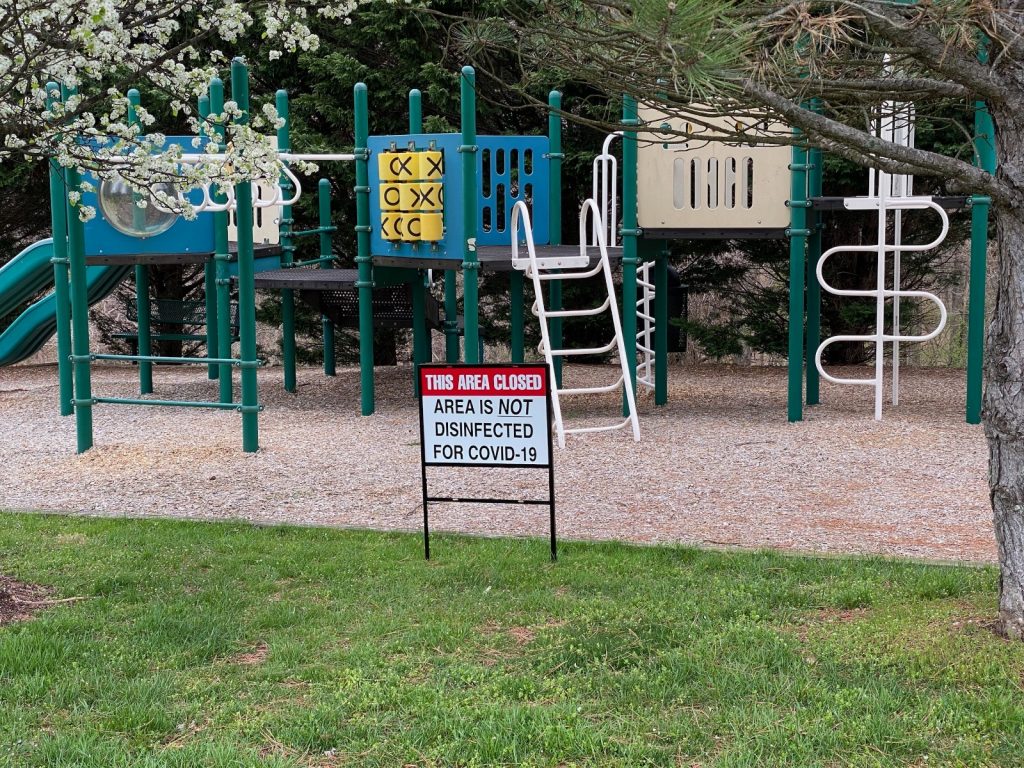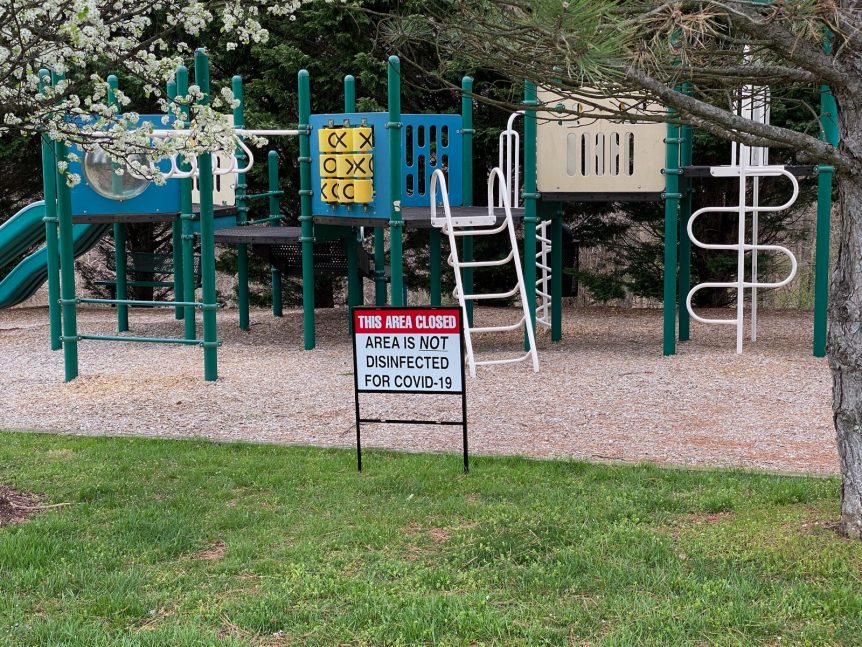 It might interest you to know that I actually wrote this post BEFORE THE COVID-19 PANDEMIC.
It might interest you to know that I actually wrote this post BEFORE THE COVID-19 PANDEMIC.
I wrote it after discovering that a good friend from our seminary days was given three months to live with chemo and six months without. Only days later, another dear friend’s husband met Jesus after battling years of health issues.
I hate sickness and death, and this pandemic hasn’t lessened that. Good people are suffering, but good people have suffered since the beginning of time.
I used to shake my fist at the sky when things like this happened and cry out to God:
“Why?”
How ridiculous I was to blame Him. What an absurd question to ask.
Living In a Broken World
If I wear a new pair of shoes on a rainy day, do I blame God when they get wet?
If I forget to put gas in my car, should I blame God when I get stranded on the side of the road?
Yes, He created rain. Yes, He created oil for petroleum. But it’s a million other decisions by thousands of people—including myself—that affect my muddy shoes and leave my car stranded. So, why do we fallible humans insist on accusing our holy, righteous God of wrong-doing?
Let’s remember that Satan’s name means accuser, and step away from that tendency. Let’s start out believing our perfectly good God intends every circumstance to benefit our lives eternally and bring Him glory in some way.
“And we know that in all things God works for the good of those who love him, who have been called according to his purpose.” Romans 8:28
Good Reason #1
You may have wanted to punch someone when they quoted Romans 8:28 during an especially difficult time. Me too! How can the death of a husband work out for my friend’s good? But let’s read the next verse to get clearer understanding:
“For God knew his people in advance, and he chose them to become like his Son, so that his Son would be the firstborn among many brothers and sisters.” Romans 8:29 NLT
The “working out for good” spoken of in v. 28 is becoming more like Jesus! As those of us who love God live through “all things,” we’re called to become more like Jesus—which is good!
Ask yourself, “How did Jesus grieve when those close to Him died (John the Baptist and Lazarus)?” As we search the Scriptures to discover how Jesus responded, we listen to His Spirit within us and allow that same Spirit to do His work in us—from the inside out.
Finding Another Reason
I’m reading through the Bible again this year, and the stories of Moses, the plagues, and the Israelites are always so profound. But one story in particular is very confusing:
“The Lord said to Moses, ‘When you return to Egypt, see that you perform before Pharaoh all the wonders I have given you the power to do. But I will harden his heart so that he will not let the people go. Then say to Pharaoh, “This is what the Lord says: Israel is my firstborn son, and I told you, ‘Let my son go, so he may worship me.’ But you refused to let him go; so I will kill your firstborn son.”’’ At a lodging place on the way, the Lord met Moses and was about to kill him. But Zipporah took a flint knife, cut off her son’s foreskin and touched Moses’ feet with it. ‘Surely you are a bridegroom of blood to me,’ she said. So the Lord let him alone. (At that time she said ‘bridegroom of blood,’ referring to circumcision.)” Exodus 4:21-26
Now, we could get waaaaay off-track here with lots of questions about circumcision and Zipporah, and a whole lot of other things, but let’s focus on one question:
Why would God try to kill a man he’d just convinced to lead His people out of Egypt?
Answer Is In the Emotion
Notice that God tells Moses about the final—and worst—plague before he ever goes to Egypt. The death of a child—a firstborn—must be the absolute worst thing a parent can endure. It’s how God describes HIS pain as He’s watched Pharaoh kill the Israelites for 400 years.
Verse 24 says God met “him” on the way (most translations interpret the pronoun as Moses) and was about to kill him, but Zipporah circumcises one son (son’s foreskin—singular because of placement of apostrophe). What if God was about to kill Moses’ firstborn son—not Moses—because he hadn’t been circumcised?
Regardless of our interpretation, on this road to Egypt, Moses EXPERIENCED the fear of death—either/both of losing his own life and the life of son. He experienced in part what Pharaoh would experience in full on the night of the tenth plague. That experience gave him God’s heart, let Moses feel what God had been feeling. That’s the first reason for bad things—to form us into the image of God and His Son.
“But just as he who called you is holy, so be holy in all you do; for it is written: ‘Be holy, because I am holy.’” 1 Peter 1:15-16
Good Reason #2
Similarly, the LORD allowed the Israelites to experience severe testing, perhaps even beyond what they thought bearable. When Moses requested Pharaoh let God’s people go, Egypt’s king placed more and harsher demands on the Israelites (Exo.5:18-21). And when the plagues began, God’s people endured the same hardships of blood, frogs, and gnats (lice).
While they gathered their own straw to make bricks and suffered thirst, disease, and itching sores, did they shake their fists at both Moses and Yahweh, crying, “Why?”
Probably.
Job did it. I’ve done it. You’ve probably done it too. But our God has broad shoulders. He cradles us even as we flail. And He whispers, “Now that you’ve experienced chains, you’ll feel the delight of My rescue.”
And that’s the second reason for bad things—so we appreciate the good. If only Adam and Eve hadn’t eaten from the tree of the Knowledge of Good & Evil, we wouldn’t KNOW sin, evil, suffering, or death. Someday, we’ll be free again from knowing the chains of evil; but for now, God allows those chains so we can seek and know the blessed freedom of His rescue.
Isaiah’s Legacy’s Message
Isaiah’s Legacy illustrates the joys of holiness and God’s rescue better than a blog post can. In the story, those who remained faithful to Yahweh during King Manasseh’s reign endured severe persecution—and they questioned God. But as in every circumstance, Yahweh’s Light eventually dispelled the darkness, and oh . . . how bright was His Light in the end.
If we never experienced hardship in this world, how could our faith be strengthened? How could we experience hope? Once we reach heaven, we’ll have no need for either.
“But we have this treasure in jars of clay to show that this all-surpassing power is from God and not from us. We are hard pressed on every side, but not crushed; perplexed, but not in despair; persecuted, but not abandoned; struck down, but not destroyed. We always carry around in our body the death of Jesus, so that the life of Jesus may also be revealed in our body. For we who are alive are always being given over to death for Jesus’ sake, so that his life may also be revealed in our mortal body.” 2 Corinthians 4:7-11
May the God of all comfort strengthen your faith as we walk together through this pandemic with a hope that can’t be crushed, abandoned, or destroyed.
Tweet-ables!
- Someday, we’ll be free again from knowing the chains of evil; but for now, God allows those chains so we can seek and know the blessed freedom of His rescue. #COVID #LiveUnchained #MesuAndrews
- If we never experienced hardship on earth, we never experience faith or hope because we need neither in heaven. #IsaiahsLegacy #LiveUnchained #MesuAndrews #COVID
- Discover 2 good reasons Gods people endure bad things, and walk through this pandemic with hope that cannot be crushed, abandoned, or destroyed. #LiveUnchained #MesuAndrews #IsaiahsLegacy #COVID
* If you’d like to be notified every time I write a new blog post, why not subscribe to my newsletter? You can get automatic blog notifications plus book recommendations, bargains, publishing news, prayer requests, and answers to questions YOU write in! CLICK HERE to subscribe and get a free novella today!
* Do you enjoy my books? Maybe wish I’d write a little faster? Beginning March 2020, I’m doing a little experiment with shorter, more frequent fiction. For just $3 a month, I’ll send out one biblical fiction short story per month–at least 4,000 words–delivered directly to your inbox through Patreon.com. (I need to charge for the stories because I’m paying for editing.) Interested? CLICK HERE for more info!



